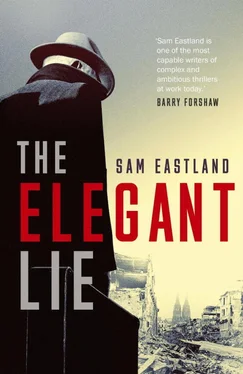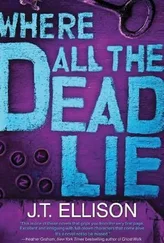On the day he was due to appear, Carter called in sick and took a taxi to a place two blocks from the Marquette Building. From there, he walked to a vegetable market across the road from police headquarters. At the back of the market was a stairway that went down to a storeroom where vegetables were kept cool before being put on display. At the back of this storeroom was a door with a combination lock, which led to a narrow tunnel that ran under the street. The tunnel was lined with off-white tiles the colour of coffee-stained teeth and had no illumination, so Carter found his way by the greasy flame of a Zippo lighter. The tunnel ended at another door, which led up to the basement of the Marquette Building. This tunnel had been built for use by undercover police, and for smuggling informants in and out of the building.
In a room on the third floor he presented himself to a man he’d never met before and who did not identify himself. He did not wear a police uniform, but from his haircut◦– short but not a military crew cut◦– and from the clothes he wore◦– a starched, pointy-collared white shirt with a brown tie and suspenders◦– Carter guessed him to be a federal agent. He had learned to place people very quickly, based on nothing more than instinct and a glance. In Carter’s line of work, the clothes a person wore told you almost everything you needed to know about them; not only where they came from but also where they imagined they were headed, in their careers and in society. Even the room told him something. It was bare, except for a desk and a filing cabinet with a clamshell for an ashtray on top. There was nothing to indicate that the man worked here. No pictures of his family. No diploma or citations on the wall. No cigarettes crumpled in the ashtray. Whoever this man was, he had come to deliver a message. That was all. Within the hour, all trace of him would have vanished.
All this made Carter very nervous.
‘You are being transferred,’ said the man, ‘to the Office of Price Administration.’
‘I’ve never heard of it,’ said Carter.
‘That’s about to change,’ said the man. ‘We were created, by order of the President, to investigate the theft of military supplies. You will be responsible for the same areas you were working in before, but you’ll be working for us from now on.’ He reached down beside him and removed a manila envelope from a briefcase. He placed the envelope on the table and slid it across to Carter. ‘This will tell you who you are reporting to. Your office is located in one of the disused warehouses on Cranston Street.’
Cranston Street was not really a street at all, but rather a wind-blown alleyway between two sets of warehouses where the sun only reached to the potholed concrete surface for about half an hour every day.
‘Wait a minute,’ said Carter. ‘I think there has been a mistake.’
The man looked at him. ‘How’s that?’ he asked.
‘I work undercover,’ explained Carter. ‘That’s all I’ve ever done, and the dockyards are the only place I’ve ever done it. I’m known there as a longshoreman. I push carts. I swing a billhook. Guys like me don’t have offices. We don’t have much of anything. My cover would be blown in a day. Do you understand me, sir? I can’t do what you’re asking of me.’
‘I’m not really asking,’ said the man, ‘and I do understand what you’re saying. But I’m telling you that things have changed. There’s a war on. You no longer have the luxury of anonymity.’
‘But wouldn’t I be more useful to you if I stayed undercover?’
‘The President doesn’t think so,’ said the man. ‘It’s his opinion that, with the Office of Price Administration, we are making a statement that the epidemic of thefts of government property across this country will no longer be tolerated. We are putting people on notice. Letting them know that they are being watched.’
‘But we’re already watching them!’ shouted Carter, throwing up his hands. ‘And I’m the one doing the watching!’
The man smiled a humourless smile. ‘There’s a difference,’ he said, ‘between going up against a local police force, which is what you were, and going up against a federal agency, which is who you are working for now. You used to put people away for, what, a year or two? And maybe you slapped them around a little bit along the way, just to remind them who’s boss. But the people you work for now will throw a man into a concrete hole and leave him there for the rest of his life. It’s a whole new game, Mr Carter. You know that now’◦– the man raised his arm and pointed towards the docklands◦– ‘and they will too, soon enough.’
That same afternoon, Carter rode the Long Branch train down to Belmar and went to see his father. After retiring from the police, the old man had sold his house in Dunellen and moved permanently to their summer cottage by the shore. It was a three-room, single-storey house that stood amongst rows of identical cottages, most of which were empty since it was October and only a few papery leaves still clung to the sycamore trees that grew on strips of grass between the pavement and the road.
Carter visited his father most weekends, just to check in on him. There was a frailty to the old man now that seemed to have come upon him quite suddenly, catching both father and son by surprise. Through all the years of his growing up, Carter had thought of his father as being indestructible and had allowed himself to believe that things would always be this way. But the years seemed to have caught up with him at last, and it was almost as if he had become somehow opaque, fading from the world like a photograph left out in the sun.
Carter’s father came to the door, moving slowly and using a rubber-tipped cane to walk. He wore a thick, waffle-grid undershirt and had not shaved in several days. His hair was thin and grey, but still cut short and a little spiky on top, the same way he had worn it in his days with the police. He had smoked heavily throughout his career, and his lungs had finally given out. Now he wheezed like a kettle coming to the boil. He spent most of his time in a chair whose leather cushions had moulded to the shape of his body.
It was cold in the house, and wind whistled in at the kitchen window.
They walked into what his parents had called the ‘family’ room, which had a couch and a couple of overstuffed chairs gathered in a semi-circle around a coffee table and facing a large radio cabinet, which stood against the wall. There were several copies of the local Asbury Park newspaper on the table, which did not look like they had been opened.
‘You should get some insulation for this place,’ said Carter, as they each took a seat in one of the overstuffed chairs.
‘I have a stove,’ said the old man, nodding to a potbellied clump of iron in the corner.
‘Do you have any wood for it?’
‘I can get wood when I need it.’ The old man reached across to a little table beside the chair and fetched his cigarettes. With crack-nailed fingertips, he rummaged in a box for a match, which he lit by striking it against one of the brass button nails that ran down the length of his chair.
Carter’s gaze followed the ribbon of smoke up to where a bloom of dirty yellow, the stain of a thousand other smokes, spread across the ceiling.
‘This isn’t your usual day for a visit,’ said his father.
Carter told him about his transfer to the Office of Price Administration.
The old man sat very still as he listened, pausing now and then to draw from his cigarette.
By the time Carter had finished, his father had put away two more smokes and was scratching at his chin with soft raking movements of his fingertips, the way a barnacle sweeps its claw through the tide.
Читать дальше











